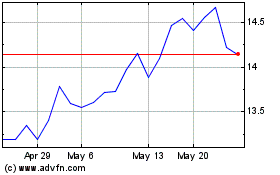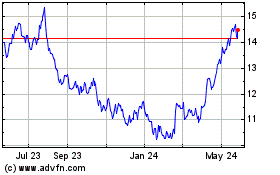Asia Stocks Higher, Australia Bucks Negative Growth Report
December 06 2016 - 11:40PM
Dow Jones News
Asian shares were broadly higher Wednesday, catching a lift from
gains in the U.S., as a weak Japanese yen helped exporters' stocks
on the Nikkei Stock Average.
The Nikkei was recently up 0.4% in morning trade. S&P/ASX
200 was 0.6% higher, even though Australia recorded its first
negative quarter of economic growth since 2011. Korea's Kospi added
0.1% and Hong Kong's Hang Seng Index rose 0.5%.
Overnight, the Dow Jones Industrial Average hit another record,
ending up 0.2%. The S&P 500 rose 0.3% and the Nasdaq Composite
gained 0.2%.
In Asia on Wednesday, the yen was recently down 0.3% against the
U.S. dollar, which improves the competitiveness of Japanese
exporters. Among individual stocks, Toyota Motor was 1.4% higher
and Panasonic rose 1.9%
"It's a combination of follow-on from positive sentiment in the
U.S. last night," said Alex Furber, a sales trader at CMC Markets
in Singapore. "Also remember, Japan is enjoying a slightly weaker
yen…so that helps buoy sentiment."
In Australia, gross domestic product fell 0.5% in the third
quarter from the second quarter. Economists surveyed by The Wall
Street Journal expected the economy to contract by 0.1%.
Treasurer Scott Morrison said a reluctance among businesses to
invest was to blame. He called on lawmakers outside the ruling
Liberal-National coalition to act "in the national interest" by
supporting budget bills, including tax cuts for small
businesses.
"Driving investment is the challenge," said Mr. Morrison, adding
that he wants to get "capital out of its cave."
Resilience in Australian stocks Wednesday was attributable to
gains by the country's big four banks, which make up about a third
of the weighting of the S&P/ASX 200 Index.
Bank stocks across Asia were benefiting from reports that Italy
was preparing to take a 2 billion euro ($2.1 billion) controlling
stake in Banca Monte dei Paschi di Siena, one of the country's many
troubled banks.
The Japanese Topix index that tracks banks was recently up 1.8%,
with Sumitomo Mitsui Financial adding 1.4% and Mitsubishi UFJ
Financial gaining 1.7%. In Australia, Westpac Banking added 1.3%,
while Commonwealth Bank of Australia gained 0.8%.
In China, the Shanghai Composite Index was recently down 0.2%,
as investors were concerned about additional scrutiny for insurers
that have been aggressive about buying stakes in companies.
On Wednesday, China's insurance regulator said it would send two
teams to inspect insurers Foresea Life and Evergrande Life, as the
government seeks to "contain possible financial risks brought by
massive stake buyouts by heavyweight insurance players," according
to the official Xinhua News Agency.
Equity investing by insurers in China has lately lifted the
Shanghai market and traders are worried that a crackdown will
remove this impetus.
"Now that insurance funds are in the regulatory crosshairs, they
will be much less of a driving force in the market," said Xiao
Shijun, an analyst at Guodu Securities.
More broadly, Asian markets are turning their attention to the
U.S. Federal Reserve meeting next week. According to CME Group's
FedWatch tool, the probability of a rise in interest rates remains
higher than 90%.
Signaling what comes after a December increase in interest rates
could prove thornier, though, due to continued uncertainty about
economic policy under a Trump administration and
Republican-controlled Congress. President-elect Donald Trump has
pledged to cut taxes and boost spending, which could spur
growth.
David Winning, Yifan Xie, Harriet Torry and Kenan Machado
contributed to this article.
Write to Ese Erheriene at ese.erheriene@wsj.com
(END) Dow Jones Newswires
December 06, 2016 23:25 ET (04:25 GMT)
Copyright (c) 2016 Dow Jones & Company, Inc.
Hang Seng Bank (PK) (USOTC:HSNGY)
Historical Stock Chart
From Nov 2024 to Dec 2024

Hang Seng Bank (PK) (USOTC:HSNGY)
Historical Stock Chart
From Dec 2023 to Dec 2024
